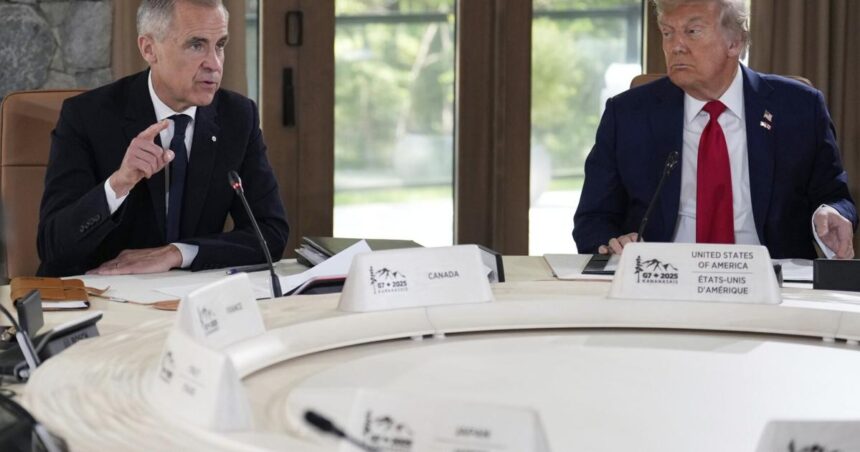Last Friday’s announcement that Canada would abandon its long-promised Digital Services Tax (DST) sent ripples through both tech and policy circles. Deputy Prime Minister Chrystia Freeland framed the decision as aligning with “international consensus” on taxation. But let’s call this what it really is: a strategic retreat that may end up costing Canadian coffers far more than advertised.
The DST, first proposed in 2020, aimed to impose a 3% tax on revenue generated by major digital platforms operating in Canada when they profit from Canadian user data and content. Now, Canada has agreed to wait for the OECD’s global tax deal to come into effect – a framework that’s been repeatedly delayed and faces substantial implementation hurdles.
“This is precisely what digital giants were hoping for,” explains Toby Sanger, executive director of Canadians for Tax Fairness. “They’ve effectively played a waiting game, knowing that international processes move at a glacial pace compared to their business operations.”
The numbers tell a concerning story. The Parliamentary Budget Officer had estimated the DST would generate approximately $7.2 billion in revenue over five years. Now that income stream has evaporated in exchange for a vague promise of future global cooperation.
The retreat comes amid intense pressure from the United States, which had threatened retaliatory tariffs if Canada implemented its DST. U.S. Trade Representative Katherine Tai had previously called such taxes “discriminatory against U.S. companies” – despite the fact that Canada’s proposed tax would have applied to any qualifying digital business regardless of nationality.
What’s particularly revealing is the timing. Canada’s cancellation coincides with similar moves by other nations like the UK and France, suggesting a coordinated diplomatic effort to satisfy U.S. concerns ahead of uncertain economic times and a potential administration change.
Beyond the immediate revenue implications, this reversal raises fundamental questions about digital sovereignty and fiscal fairness. Large tech platforms have perfected the art of revenue shifting – directing profits to low-tax jurisdictions while extracting value from markets like Canada.
“Digital companies can operate virtually with minimal physical presence yet capture enormous value from Canadian consumers and businesses,” notes Vass Bednar, executive director of McMaster University’s Master of Public Policy program. “Our tax systems remain designed for an analog economy while digital giants operate in a different reality.”
A closer look at the numbers reveals the scale of the issue. According to Statistics Canada, foreign digital service providers collected approximately $8.7 billion from Canadian customers in 2021. Yet their tax contributions remain disproportionately small compared to traditional businesses with similar revenue footprints.
The Canadian government’s retreat is particularly puzzling given global trends. India implemented its own digital services tax in 2020 and has collected over $1.2 billion as of early 2023. Spain’s “Google tax” brought in €92 million in its first year. These countries have demonstrated that unilateral action is not only possible but potentially lucrative.
The promise that Canada will benefit from the OECD’s “Pillar One” framework – which would reallocate some taxation rights to market jurisdictions – comes with significant caveats. The framework remains incomplete, with multiple technical details unresolved. More importantly, it requires ratification by the U.S. Congress – a prospect that appears increasingly unlikely in the current political environment.
“The OECD process has been ongoing for years with constantly shifting timelines,” explains Allison Christians, Professor of Tax Law at McGill University. “Meanwhile, digital companies continue to grow their Canadian market presence while contributing minimally to the tax base that funds the infrastructure they rely on.”
This retreat also creates an awkward contrast with other areas of digital policy. The government has pushed forward with the Online News Act and Online Streaming Act – both designed to regulate digital platforms – yet has backed down on taxation, arguably the most significant economic lever at its disposal.
Some industry observers suggest the government may have made this concession to improve the implementation of these other digital regulations. If so, it represents a significant gamble, exchanging billions in guaranteed revenue for potential cooperation on other files.
For Canadian businesses operating in the digital space, the continued tax advantage enjoyed by foreign tech giants creates an uneven playing field. Domestic companies face the full brunt of Canadian corporate taxation while competing against multinationals that can leverage international structures to minimize their tax exposure.
“When you’re a Canadian startup competing with Silicon Valley giants who have effective tax rates in the single digits, you’re fighting with one hand tied behind your back,” says Ali Asaria, founder of Tulip Retail. “This isn’t just about government revenue – it’s about competitive fairness.”
The most immediate impact may be felt in Canada’s 2024 budget planning. The expected DST revenue had been factored into fiscal projections, creating a potential shortfall that must now be addressed through other means.
There’s still a slim possibility that Canada could reverse course again if the OECD process stalls further. The government has indicated it retains the right to implement a DST if global tax reform fails to materialize. However, such a move would face even steeper diplomatic challenges after this public retreat.
What remains clear is that as digital services continue to capture an increasing share of economic activity, the mismatch between where value is created and where taxes are paid will only grow. Canada’s decision to abandon its DST might satisfy diplomatic pressures in the short term, but it leaves fundamental questions about digital taxation unanswered.
For a country facing fiscal pressures and trying to fund ambitious social programs, walking away from billions in potential revenue is a choice that may ultimately prove more expensive than the tax it abandoned.






